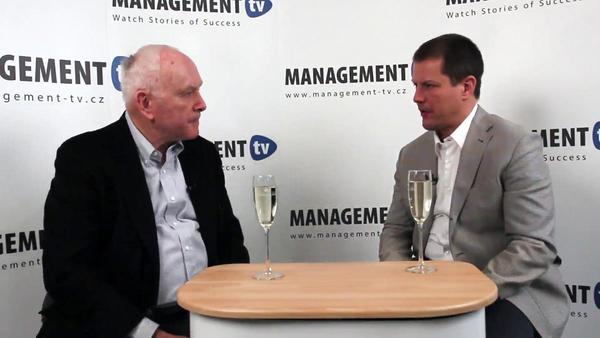The video interview is available here: Robert Hogan on Management TV: True leadership is not a matter of politicking or charisma.
We are now at a conference of Assessment Systems, Czech Republic and your speech is more aimed on how organisations behave and what kind of leadership they choose. And basically one of the most important things I heard in your speech was that 70% of all leaders or 70% of top managers in the United States shouldn’t be at their positions. Why do you think it is so?
My background, I’m basically an engineer. I really believe in data and I really believe in making things run well and I think the key to a well-run team is a good manager. The data are perfectly clear: 70% of American employees, people in America, 70% of them say they would take a pay cut if someone would fire their boss. People care more about how they’re treated than they care about how they’re paid. They care more about how they’re treated than they care about their salaries. That’s true. The data is perfectly clear on this – if you believe in data.
If we take a closer look at your testing methods, how do you prove that what you actually test and how people behave has a close correlation?
It’s all life. The world is all about statistics and to do the assessment thing correctly is actually quite hard. Most of our competitors cheat. As far as I know, we’re the only test publisher in the world who does things correctly. To do things correctly you write a series of items and you have people answer those items and you gather performance data on those people and you compare the items on the responses with their performance. And then you have to do that again and again and again until you have a set of items that predicts, for example, performance and sales. So you get a set of items: you get performance and sales and you compare the items on performance and sales and you do it again and do it again until you get a group of items that are tightly focused on performance and sales and you know that they work. But to do that takes a long time and a lot of work and a lot of money. It’s more than most people and most of my competitors are willing to invest. They don’t want to invest the time and the money to do the proper research. And we have data on every job in the US economy, every job from janitor to CEO, casino dealers, horse jockeys, blah-blah-blah, so that there’s a right way and it’s very atheoretical: you just say what items from this group predict performance over here and then once you find the items that predict, then you can talk about the theory of the whole thing. But first it’s just very analytical, very statistical; they call it big data these days. You find items that predict performance, then that’s how you proceed.
When you take a look at your whole life’s work, what is the biggest thing that’s changed from the 1660s to 2016 or 17, which is going to be? What is the biggest difference in the company management, in the leadership skills? Is there a big change from the 60s till now?
There are definite changes. I’m an academic, I was at a university most of my academic career. In the 1960s academics, who are the source of ideas for everything, academics absolutely did not believe personality existed. They thought there was no such thing as personality; that what people did depended on the circumstances they were in and I mean I’m the guy, that was the fight that I had to carry on when I started to prove that personality exists and it actually matters. Then, associated with that, so no one believed in personality, associated with that, no one believed in leadership. They said that – I used to teach the course – the textbook said that leadership is a function of a situation. It all depends on the situation: a good leader here can’t be a good leader there because the situations are different. So I’m the guy that made the case that (a) personality is related to leadership; and (b) leadership really matters, and a good leader here is going to be a good leader here if the job is the same. A good football coach here is going to be a good football coach here. You follow these guys around: they go from one team that’s a loser. This guy Mourinho, the Portuguese guy, he was what? He was at Chelsea, I think it was his first team. They were nothing; he took them to the World Cup and everywhere he’s gone he’s taken the team – that’s leadership. And it’s real. But academics and business people didn’t believe that. And I don’t know why because it’s perfectly obvious. The great general of the American Civil War was a fellow called Ulysses S. Grant.He never, ever lost a fight – ever, at any level of command. The circumstances for Ulysses Grant, the circumstances in which he was in charge, changed constantly but he was a winner everywhere he went. Here’s a rule: winners win and losers lose.
What I understand is that you distinguish between politicians – and it doesn’t matter if a politician in politics or in business – and leaders. What’s the biggest difference?
There’s real data on this. One more time: my background is in engineering. We’re a data-based organisation. We only believe in data. And most people don’t believe in data. They just believe in their own ideology or whatever but data are your friends ... So the data are quite clear. There are people in organisations who rise very quickly, who get rapid promotions and get rapid pay raises; and then there are people in organisations whose team performs very well and they’re not the same people. The people that rise rapidly are not in charge of high-performing teams and the people in charge of high-performing teams do not rise rapidly. And if you follow them round during the day, they do very different things. People who rise rapidly spend all their time on the phone networking; the people whose teams perform very well spend all their time working on their teams. Organisations don’t know who’s doing a good job; they only know who they like. And who do they like? The guys who are on the phone with them all day. Who do they not know about? The guys who are actually doing a good job. So the big challenge in organisations is to get them to focus on results, pay attention to the guys whose teams are performing well and ignore the guys who are good at networking.
If you take a look at the whole system, from the elementary school, secondary school, universities these days and everything: what you say in your work is quite revolutionary because in the traditional model the companies hire the best students from the MBA schools or special engineering schools, then they promote them, they make them talents or high potentials and managers and everything just climbs directly on the organisational ladder.
Yes.
What should the companies at present do to change this issue, to hire really good people, not the people who are cool, most charismatic, according to their MBA schools they studied?
I would say two things. First, I think the larger a business organisation gets, the more it will come to resemble the government. So that in really big companies like General Electric, they’ll be indistinguishable from the Department of Defense and it’ll be all politics all the time and because they’re too big to fail it just doesn’t matter how badly they’re run because they’re too big to fail. Where leadership matters is at the level of startups and new companies. And startups and new companies are the future of your business and our business. So that’s where leadership matters. And so with regard to these big companies, they’re just going to have to fail because they don’t care. You can’t reform them, it’ll never be about leadership, it’s always about politics but where leadership really, really matters is in the small startups and the small startups are the future of your economy.
I run a small business and if we fail, we fail because …
That’s where real pressure exists.
But on the other hand, the sort of people who are here at today’s conference are people who are responsible for departments, HR managers. What should they do?
They should do things right. They should do things correctly and try to avoid politics. They should try to reform their organisations from the inside. They should try to promote people based on talent and not on politics. It’s hard.
You mentioned personality decides. And even if somebody’s a successful politician, he’s still successful. And you mentioned that winners win, losers lose. And if you get on the top in politics – and it doesn’t matter if you’re in an organisation or in politics, you must be successful. You must have some personality, real skills …
Real skills. Yes, absolutely. I mean, I won’t lie: I personally don’t like politicians but you have to really admire ... I mean ... er ... Barack Obama. I think he’s pretty much failed as a leader but he’s a very successful politician and he has some real skills. He’s fabulous on his feet: he can give ... that’s mostly what they have. It’s just that they can give a really, really good speech. But ... er, Hitler ... right? He was really good in front of an audience. I mean he was really good and I’m sure he was quite smart in terms of knowing how to read people and manipulate things. So that real politicians have real skills but their skill involves building a constituency that will support them for wherever they want to go.
You define the four most important traits of personality for one to become a good leader, which is …
The thing is integrity; you have to be able to trust them. Second is they have to make good decisions and part of making good decisions is to understand when you made a bad decision and then fix it. So they need to have integrity, they need to make good decisions and the third thing: they need to know something about the business; they need to know what they’re talking about. And my example there is universities. University administrators are failed academics. They are people who failed in the business so they go into administration and that’s why universities are so badly run. And then the fourth thing is: they have to have a vision for the future and it can’t be a bullshit vision that they pulled out of their butt; it has to be a real careful construct. You know, here’s what we’re going to have, here’s what the opportunities are, here’s where the competitors are; this is what we need to do, this way. You know, that’s a proper vision of the future, a successful way to the future. And it’s not something like Donald Trump saying “We’re going to win again.” That’s not a vision: that’s just an empty statement. A real vision would be tax reform, doing this with the military, building relations and restoring proper relations ... you know, anyway, a vision is a strategic statement about a future purpose. It’s got to be smart. It’s hard to construct such a vision, as opposed to “We’re just going to win again. We’re going to be tired of winning cos we’re going to win so much.”



